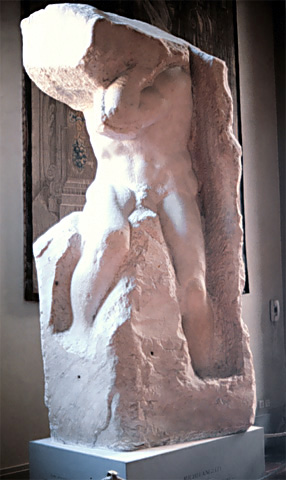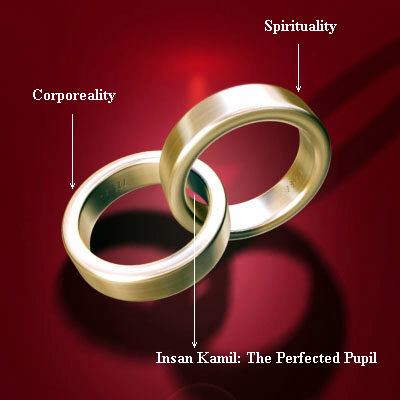The Third State

Discussion Join
See Also:
http://www.untiredwithloving.org/kashani_togetherness.html
Azizam (My dearest), the corporeal and the spiritual are not the only
states of the human Wujud (Being-ness).
There is a third state: Insān Kāmil
a mix of corporeal and spiritual whilst the human is alive subject to
the temporal transience of this world.
The third state is felt when the Divine Rays of the beauty of Ahadiyat
(Divine Oneness) shine upon the human Wujud (Being-ness) and
that Wujud is blessed by the dyes [2:138] of the Oneness, like a cloth
dipped within colors, thus absorbing whatsoever color it comes close
to. Or like a person on a stage underneath the multi-color stage-lamp
and no matter which color light shone upon his Wujud, he has that color
by default! Remember dearest that this coloration is unconscious and
non-cognitive and the decision for the person to be dyed, with certain
color from the palette of the Tauhid (Divine Oneness),
is primordial and Azali (Sempiternal).
تفسير تفسير القرآن /
ابن عربي (ت 638 هـ)
{ صبغة الله } أي: آمنا بالله وصبغنا الله صبغة، فإن كل ذي اعتقاد ومذهب
باطنه مصبوغ بصبغ اعتقاده ودينه ومذهبه. فالمتعبدون بالملل المتفرّقة
مصبوغون بصبغ نيتهم، والمتمذهبون بصبغ إمامهم وقائدهم، والحكماء بصبغ
عقولهم، وأهل الأهواء والبدع المتفرّقة بصبغ أهوائهم ونفوسهم، والموحدون
بصبغة الله خاصة التي لا صبغ أحسن منها ولا صبغ بعدها. كما قال رسول الله
صلى الله عليه وسلم: " إن الله تعالى خلق الخلق في ظلمة ثم رشّ عليهم من
نوره، فمن أصاب من ذلك النور اهتدى، ومن أخطأ ضلّ " ، فذلك النور هو صبغته.
The second meaning is that of purification by means of immersion within
water e.g. Baptism. You may ask purification from what? Purification
from Nafs (Self) and ‘I’ i.e. the momentary transience is no longer
consciously viewed in and of itself, but as the primordial Divine
Decree or unconscious non-cognitive primordial decisions, remotely
controlled the transience of that moment vis-à-vis the third
state Insān
Kāmil.
تفسير
الجامع لاحكام القران/ القرطبي (ت 671 هـ)
صِبْغَةَ ٱللَّهِ وَمَنْ أَحْسَنُ مِنَ ٱللَّهِ صِبْغَةً وَنَحْنُ لَهُ
عَابِدونَ
وروي عن مجاهد والحسن وأبي العالية
وقتادة: الصّبغة الدِّين. وأصل ذلك أن النصارى كانوا يصبغون أولادهم في
الماء، وهو الذي يسمُّونه المعمودِيّة، ويقولون: هذا تطهير لهم. وقال ٱبن
عباس: هو أن النصارى كانوا إذا وُلد لهم ولد فأتى عليه سبعة أيام غمسوه في
ماء لهم يقال له ماء المعمودِيّة، فصبغوه بذلك ليطهّروه به مكان الخِتان؛
لأن الختان تطهير، فإذا فعلوا ذلك قالوا: الآن صار نصرانيًّا حقًّا؛ فردّ
الله تعالى ذلك عليهم بأن قال: { صِبْغَةَ ٱللَّهِ } أي صبغة الله أحسن
صِبغة وهي الإسلام؛ فسُمِّيَ الدِّين صبغة ٱستعارة ومجازاً من حيث تظهر
أعماله وسِمَته على المتديِّن، كما يظهر أثر الصبغ في الثوب.
In all this, the human Wujud (Being-ness)
reaches the perfection while still biologically alive, the commix of
the corporeal and spiritual, wherein Nafs and ‘I’ become the absent
third person i.e. Hu/Huwa, and the perfection of Insān Kāmil
is that of a perfected pupil of an eye, glancing from there to here,
from Azal (Sempiternity) to Muhdath (Temporal Transience), looking at
what was a moment ago a discernable person and now within the Waqt
(Nonce, Presence) a distant book that is being viewed and read by the
said pupil. And my love you may ask this faqir (Pauper) how such state
can be obtained and the answer was given prior to the question and the
questioner: Ishq (Unrestrained Love):
“And if again his ‘Ishq (Unrestrained Love) glides aloft to view the
Tauhid (Divine
Oneness), then he becomes as if a third-person absent-pronoun
Hu/Huwa. His Tauhid (Divine Oneness)
singled out and away from the bother of the transience.” Baqli Shirazi
'Abharul 'Asheqin (The Lovers’ Daffodil), chapter
32.
Qushairi:
There is a dye for the hearts, a dye for souls, a dye for Sirr (Divine
Observatory), a dye for Zahir (Emergent Abstract), the corporeality
dyed by the dye of conformation/adaptation (to Divine Decree &
Design) and the souls are dyed by the dye made from the Nur (Divine Light)
of Tahqiq (Divine Observations firmly placed, beyond doubt within the
heart). Al-Wartajabi said: Sibghatullāh (Dye or purification from Allah) [2:138]
is an exclusive Sifat (Attribute) which Adam’s creation was based upon,
and it was inherited by his prophetic and Aulia (Close Friends of
Allah) off-springs. Then continued: This peculiar and fundamental
attribute was given the wine of approaching closeness to Allah, was
inspired (Ilhām) specialized Divine Knowledge, this attribute was
illuminated by the Nur (Divine Light)
of Ma’refat (Unlearnt knowledge placed within the heart), immersed
within the sea of Divinity, and from this attribute the secrets of
Divine Oneness is extracted, and dyed by the coloration of the Sifāt
(Divine Attributes).
تفسير البحر المديد
في تفسير القران المجيد/ ابن عجيبة (ت 1266 هـ)
قال القشيري: فللقلوب صبغة، وللأرواح صبغة، وللسرائر صبغة، وللظواهر صبغة،
فصبغة الأشباح والظواهر بآثار التوفيق، وصبغة الأرواح والسرائر بأنوار
التحقيق. هـ. وقال الورتجبي: صبغة الله: صفته الخاصة التي خلق آدم عليها،
وأورثت ذلك في أرواح ذريته من الأنبياء والأولياء. ثم قال: وسقاها من شراب
الزلفة، وألهمها خصائص علوم الربوبية، فاستنارت بنور المعرفة، وخاضت في
بحر الربوبية، وخرجت منها تجليات أسرار الوحدانية، وتكوّنت بصبغ الصفات.
هـ. وبالله التوفيق.
Razi:
Sibgh of Sibghatullāh in [2:138] is the dye that colors the fabric, and
the Sibghah is the state (Hāla (Momentary State)).
This peculiar state of the Human Wujud (Being-ness) is
a momentary state that has entrance, duration and finally exit.
تفسير مفاتيح
الغيب ، التفسير الكبير/ الرازي (ت 606 هـ)
المسألة الأولى: الصبغ ما يلون به الثياب ويقال: صبغ الثوب يصبغه بفتح
الباء وكسرها وضمها ثلاث لغات صبغاً بفتح الصاد وكسرها لغتان. (والصبغة)
فعلة من صبغ كالجلسة من جلس، وهي الحالة التي يقع عليها الصبغ، ثم اختلفوا
في المراد بصبغة الله على أقوال. الأول: أنه دين الله وذكروا في أنه لم
سمي دين الله بصبغة الله وجوهً. أحدها: أن بعض النصارى كانوا يغمسون
أولادهم في ماء أصفر يسمونه المعمودية ويقولون: هو تطهير لهم. وإذا فعل
الواحد بولده ذلك قال: الآن صار نصرانياً. فقال الله تعالى: اطلبوا صبغة
الله وهي الدين، والإسلام لا صبغتهم، والسبب في إطلاق لفظ الصبغة على
الدين طريقة المشاكلة كما تقول لمن يغرس الأشجار وأنت تريد أن تأمره
بالكرم: اغرس كما يغرس فلان تريد رجلاً مواظباً على الكرم
Historical Occurrences
Noah
“And we carried him upon the planks with nails” [54:13]: In this verse
the word Dhāt (Essence or Attribute) is used to point out the
importance of the planks and the nails as the corporeal objects that
were a part of the spiritual voyage of Noah! Otherwise what was the
importance of these lowly substances, Noah’s spirituality was immixed
with the planks and nails or else he could not travel as was decreed.
وَحَمَلْنَاهُ
عَلَى ذَاتِ أَلْوَاحٍ وَدُسُرٍ
Moses
This prophet saw a burning tree or shrubbery somewhere in the desert
[20:12], and the burning plant spoke to Moses: I am
Allah! Here is
another example of the spiritual realm immixing with the corporeal for
the Human Wujud (
Being-ness)
within the transience of this world is unable to have direct view and
linkage with the other world. Moses’s spiritual observation, as in the
case of the Noah’s spiritual voyage, was commixed with the corporeality
of this life.
إِذْ رَأَى نَارًا فَقَالَ لِأَهْلِهِ
امْكُثُوا إِنِّي آنَسْتُ نَارًا لَّعَلِّي آتِيكُم مِّنْهَا بِقَبَسٍ
أَوْ أَجِدُ عَلَى النَّارِ هُدًى 10 فَلَمَّا أَتَاهَا نُودِي يَا مُوسَى
11إِنِّي أَنَا رَبُّكَ فَاخْلَعْ نَعْلَيْكَ إِنَّكَ بِالْوَادِ
الْمُقَدَّسِ طُوًى
Muhammad
”And you did not throw when you throw, it was Allah who threw
(the projectile)” [8:17], here the Prophet, peace be upon him, was
assured that his army did not kill anyone! It was all along Allah who
killed the enemies and it was not their arms that threw arrows or
spears it was all along Allah throwing
فَلَمْ تَقْتُلُوهُمْ
وَلَـكِنَّ اللّهَ قَتَلَهُمْ وَمَا رَمَيْتَ إِذْ رَمَيْتَ وَلَـكِنَّ
اللّهَ رَمَى وَلِيُبْلِيَ الْمُؤْمِنِينَ مِنْهُ بَلاء حَسَناً إِنَّ
اللّهَ سَمِيعٌ عَلِيمٌ
Haven’t you heard Allah
saying: …And when I love him (Allah’s Wali) I will be his ear that he
hears with, and the eye with which he sees, and the arm that he hits
with, and the feet that he walks with…
الجامع الصغير.
الإصدار 3,22 - لجلال الدين السيوطي
المجلد الثاني >> [تتمة باب حرف الألف]
1752- إن الله تعالى قال: من عادى لي وليا فقد آذنته بالحرب، وما تقرب إلي
عبدي بشيء أحب إلي مما افترضته عليه، وما يزال عبدي يتقرب إلي بالنوافل
حتى أحبه، فإذا أحببته كنت سمعه الذي يسمع به وبصره الذي يبصر به، ويده
التي يبطش بها، ورجله التي يمشي بها، وإن سألني لأعطينه، وإن استعاذني
لأعيذنه، وما ترددت عن شيء أنا فاعله ترددي عن قبض نفس المؤمن: يكره
الموت، وأنا أكره مساءته
التخريج (مفصلا): صحيح البخاري عن أبي هريرة
تصحيح السيوطي: صحيح
The corporeal and the spiritual are entangled, as entanglement of two
rings. They never touch, for that is impossible, but if you pull the
rings as hard and as far apart as you can, then an extreme is resulted
i.e. Insān
Kāmil—The Third State of Human Wujud (Being).

Q: what is that energy that pulls the rings apart?
A: ‘Ishq (Unrestrained Love):
“And when she she passionately desired him and he (Joseph) passionately
desired her” [12:24]
وَلَقَدْ هَمَّتْ
بِهِ وَهَمَّ بِهَا
Within the vision of Zulaikha the woman who fell in love with Prophet
Joseph, the Divine Beauty that was bestowed upon Joseph was immixed
with his corporeality and produced a love that went stir-crazy i.e.
Ishq that was unrestrained, and similar to rings of a chain they were
entangled and no matter which way they are pushed and pulled only one
reality was realized: The Divine Beauty that saved the Egypt from the
imminent massive famine, the Divine Beauty that was observed by the
believer and the non-believer, made Tajalli (Lucent Manifestation)
through the face and the body of a Hebrew lad, the light that is
shining up to this time.
Don’t fool your Self with fancy names like corporeal or spiritual or Insān Kāmil,
the only thing real and the only reality you may grasp is the said
entanglement that gives you a pupil to see from there into here:
“If not that he saw the demonstration of his Lord” [12:24]
Note: The ocular process is mentioned i.e. saw,
to indicate that within the struggle of passionate love a vision may
appear for the heart to see!
©
2006-2002, Dara O. Shayda

